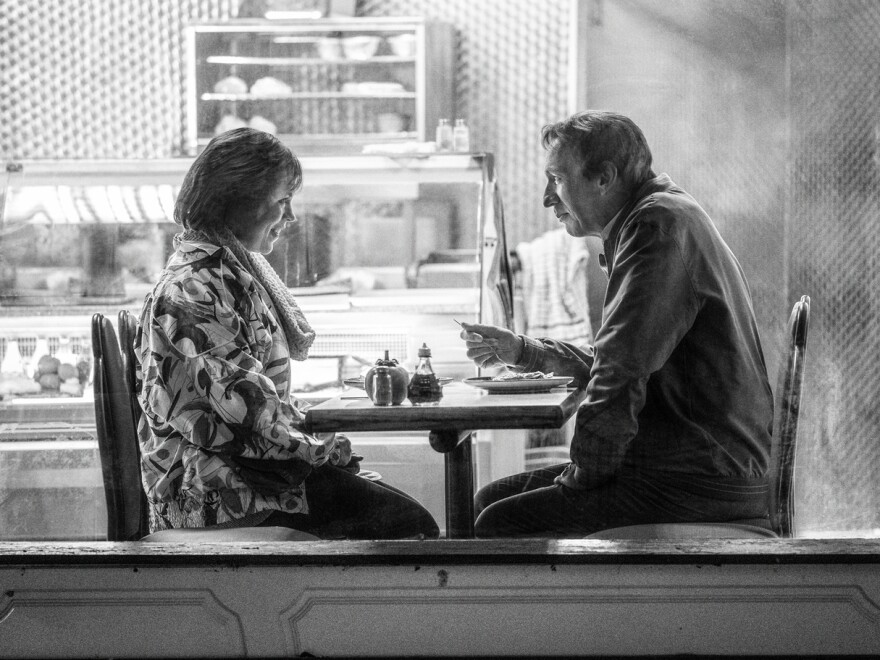Updated December 6, 2021 at 4:47 PM ET
(Fair warning: This review will dig up some spoilers from HBO's Landscapers.)
As HBO's inventive limited series Landscapers begins, we meet mild-mannered couple Christopher and Susan Edwards – a pair cute enough to seem imported directly from a genteel British drama on PBS.
Susan, played by Olivia Colman, is a bright-eyed, optimistic former librarian with a secret habit of paying too much for movie memorabilia – especially posters of the old Gary Cooper westerns she once watched with her grandfather. Christopher is a doting, protective husband, played by David Thewlis, searching for work as an accountant in France, where the couple have moved from their native Britain.
But viewers soon learn they are hiding a deadly secret: The pair moved from England to prevent authorities from discovering they had buried Susan's mother and father in the backyard of her parents' home 15 years ago, letting the world continue to believe the older couple was still alive.
The limited series declares from its opening moments that the Edwards – a real-life couple – were convicted of murder in 2014 and sentenced to a minimum of 25 years in prison. They also still maintain their innocence.
Having given away what is usually the central question in a true crime story – namely, whodunnit and did they get away with it? – Landscapers can set about its real goal: Depicting the bizarre internal world of a couple that lies to each other and the world at large, living inside a peculiar personal bubble that rationalizes their participation in a most grisly crime.

A couple which keeps secrets even from each other
Midway through the first of HBO's four installments, Thewlis' Christopher Edwards blows up at Susan when she suggests he will soon get a callback from his latest job interview. It turns out, his French is so terrible, he has no chance of getting hired and he never really told her how badly the interviews were going.
That's matched in short order by Susan, who has secretly racked up crushing credit card debt by seriously overpaying for movie memorabilia – forcing Christopher to call his stepmother for financial help, eventually telling her everything. The stepmom reports him to police, then tells him in an email what she did, much to the consternation of investigators.
The early part of this story is a farce of sorts, depicting police clumsily investigating the report, and realizing, even after they find the bodies, they don't have enough evidence to force the Edwards to come back to England.
(One of my favorite scenes features a supervisor of detectives on the case angrily explaining the rules of evidence to his brightest investigator, pointing to another detective in frustration, saying, "he's thick as two short planks, and he knows" why they can't arrest the couple in France).
But the Edwards are convinced they have a reasonable explanation for what happened — I'm not going to spoil the details here — so Christopher sends a polite email to police requesting train fare back to England, where they are promptly arrested.
Depicting a fantasy world created by avoidance
Where Landscapers truly excels is in depicting the fantasy world Susan escapes to during times of stress, when she pictures herself and Christopher as characters in the movies she loves. One minute, they're gazing as each other lovingly in a black and white romantic comedy; as their situation grows more dire, she imagines them as heroic outlaws in a western, shooting it out with lawmen who look an awful lot like the investigators handling their case.
The staging here is inventive and cheeky. When police offer an alternative theory of the crime during an interrogation — they think Christopher shot both parents — the episode transitions into a reality-bending sequence where the detective leads Christopher and Susan to a film set depicting her mother and father's bedroom, politely requesting the older couple lie down in their bed so Christopher can kill them.
In addition to the direction and inventive staging, the real draw here is performances by Thewlis and Colman, who bring unexpected depth to playing a couple depicted as cold-hearted killers in much of their press coverage. In Thewlis' hands, Christopher is kindly and finds fulfillment in safeguarding Susan, who he repeatedly calls "fragile."

Colman puts her liquid, expressive eyes and emotional range to good use as Susan, who has her own dark allegations against her parents and, eventually, comes to terms with what she's done to cope.
But Landscapers also boosts the impact of its stars' performances by avoiding or downplaying uncomfortable moments which might make it tougher to empathize with the couple.
We don't see them forging letters and Christmas cards to relatives in an effort to make it seem Susan's parents were still alive and traveling the world. According to some press accounts, the couple sent forged documents to keep receiving her parents' pensions and faked their signatures on sale papers for their house, siphoning off hundreds of thousands of pounds to support themselves.
In the series, investigators show documents indicating Susan took over her parents' bank accounts days after their deaths. But we never actually see her doing it, though many other events in the couple's life are depicted in long flashbacks.
The result is a miniseries which offers a wonderfully inventive look at a bizarre case, with top-notch acting and direction. But its quality also encourages viewers to identify with a couple who may not deserve the empathy this show will likely generate.
Copyright 2022 NPR. To see more, visit https://www.npr.org.




